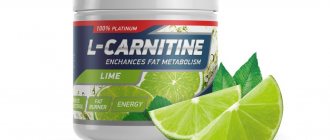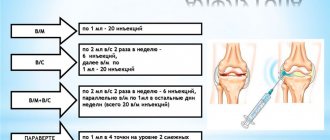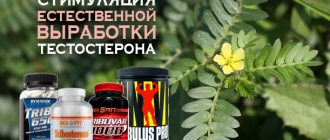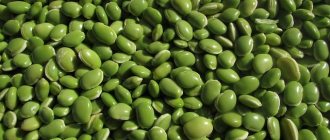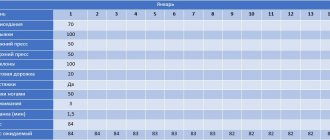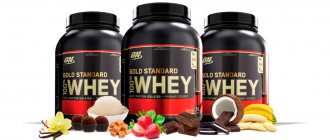Beta-alanine is a popular supplement among athletes who want to build muscle and increase their energy levels. The list of beneficial properties of the substance does not end there.
Doctors recommend taking beta alanine during menopause to reduce unpleasant symptoms, as well as improve hormonal levels and support the body during a difficult period. In this article we will understand how the amino acid affects women, how to take it correctly and what medications to choose during menopause.
Benefits for women
Beta-alanine is a very important substance for the female body, involved in maintaining good health and reproductive function. It affects the condition of peripheral blood vessels, balances the levels of central neurotransmitters, and helps control autonomic vasomotor processes that underlie the negative manifestations of menopause.
The amino acid has a number of therapeutic effects for patients during menopause:
- eliminates headaches and dizziness;
- reduces the frequency of hot flashes;
- reduces redness and heat of the skin;
- suppresses excessive sweating;
- normalizes mood;
- improves sleep quality;
- relieves nervousness and irritability;
- improves metabolism;
- prevents excess weight gain during menopause.
In addition to its effect on menopause, the amino acid beta-alanine has other beneficial properties for women of any age. The substance enhances immune activity and reduces the risk of viral and bacterial infections. Beta-alanine is involved in neutralizing free radicals, due to which it slows down the appearance of age-related changes in the body.
What are the benefits of citrulline for men and women?
Citrulline is involved in metabolism, therefore it has a positive effect on the entire human body. However, the following main functions can be distinguished:
- Contained in immunoglobulins.
Immunoglobulins are antibodies found in the blood that protect the body from bacteria, fungi and viruses. Human immunity is entirely dependent on the production of immunoglobulins.
- Improves blood circulation and normalizes blood pressure
(best helps with high blood pressure).
- Participates in metabolism, removes ammonia and lactic acid from the body through the formation of urea.
- Saturates muscle tissue with nutrients, promotes healing of muscles and skin.
For medical purposes, the nutritional supplement is prescribed to people with chronic fatigue and lack of sleep, diabetes, and too slow or fast metabolism. Citrulline can be prescribed after surgery to speed up recovery or for older people to generally strengthen the body.
L-citrulline is also taken for potency. The positive effect is due to the synthesis of nitrous oxide, which dilates the walls of blood vessels and improves blood circulation. Thus, the cavernous bodies fill faster and more actively.
Indications for use
Most often, gynecologists prescribe medications for severe symptoms of menopause. This is a good alternative to hormonal medications, which work effectively, but have many side effects, which is why many women are forced to stop taking them. Dietary supplements can be prescribed in premenopause, as well as throughout the entire menopausal period.
There are other indications for the use of drugs:
- stress, increased work loads;
- mood swings, seasonal depression;
- frequent respiratory diseases;
- deterioration of memory and concentration;
- muscle weakness, increased fatigue;
- sleep disorders;
- decreased endurance during fitness training.
Since plant foods contain minimal amounts of beta-alanine, it is advisable for vegetarian and vegan women to take amino acid supplements on a regular basis.
Instructions for use.
Deciding on how much beta-alanine to take depends on the individual characteristics of the body and the goals set. Usual dosages suggest 2000 to 5000 mg per day. The effect is dose-dependent, but it is important to consider that taking beta-alanine in large quantities can not only cause discomfort, but also reduce the concentration of taurine, which is also an important substance that ensures cell regeneration. Therefore, the instructions for use of beta-alanine advise not to exceed the dosages recommended by the manufacturer and doctors.
As for the time of administration, it practically does not matter, but many find it convenient to take the amino acid before training, along with other supplements (creatine, BCAA, etc.).
It is necessary not only to pay attention to how to take beta-alanine correctly, but also to its compatibility with other substances. In particular, the synthesis of carnosine also requires histidine, the level of which may also be insufficient, therefore, when taking beta-alanine, it can be supplemented with histidine, especially in cases where protein nutrition is insufficient (with vegetarianism and other cases of restriction in protein foods).
The instructions recommend taking beta-alanine with creatine - they combine well and the total effect of taking them can be greater than when taking one drug. But beta-alanine does not combine with taurine due to the fact that these substances compete for delivery mechanisms. Therefore, taking beta-alanine inhibits the accumulation of taurine, and vice versa.
Contraindications and harm to the body
The only limitation to the use of dietary supplements with amino acids is individual intolerance to the substance or the auxiliary components of the tablets. If a woman does not follow this rule, she may experience side effects: itchy skin rashes, watery eyes, nasal congestion, difficulty breathing. Such symptoms indicate an allergic reaction and require immediate discontinuation of the drug and consultation with a doctor.
An allergy may occur not to beta-alanine, but to starch, which is often used in the manufacture of tablets. Therefore, it is necessary to carefully read the instructions for the chosen drug.
Negative effects from taking an amino acid develop when it is overdosed. The condition is manifested by soreness in the muscles and joints, a sensation of “crawling goosebumps” on the limbs, and severe insomnia. Occasionally, an overabundance of the substance causes memory loss and deterioration in concentration. If such symptoms develop, you must stop using the supplement.
Beta-alanine in food
Table – TOP 10 food sources of beta-alanine:
| The product's name | Amount of nutrient per 100 g of product, mg |
| Soya beans | 1,9 |
| Veal | 1,9 |
| Chicken breast | 1,9 |
| Red caviar | 1,8 |
| Pork | 1,7 |
| Turkey | 1,6 |
| Trout | 1,6 |
| Shellfish | 1,5 |
| Mackerel | 1,4 |
| Sturgeon | 1,3 |
The concentration of the substance in products decreases sharply during prolonged heat treatment, so it is extremely difficult to meet the increased need for beta-alanine from food sources.
What is beta-alanine?
The word “beta” in the name of the substance means that in the molecule the amino group is connected not to the carbon atom closest to the carboxyl group (as in all alpha amino acids), but to the next one (beta carbon). All amino acids that make up proteins (glycine, leucine, valine, glutamine, tryptophan, etc.) are alpha amino acids. Beta amino acids are not part of the proteins of living organisms, and in general, only one of these amino acids is present in the human body - beta-alanine.
But nevertheless, when combined with the amino acid histidine, beta-alanine forms carnosine, an extremely important substance that regulates metabolism in muscle cells. Carnosine binds lactic acid, which is released during muscle work and causes a burning sensation in tense muscles. Reducing muscle wasting and increasing calcium channel sensitivity allows for increased muscle contraction during work.
In addition, this substance is an antioxidant that slows down the aging process. It has been established that in elderly people the concentration of carnosine is noticeably lower than in young people (by 35%), therefore it is believed that increasing carnosine reserves helps delay the onset of old age.
Rules for taking medications
The standard daily dosage of drugs with beta-alanine to eliminate signs of menopause is 400-1200 mg. The exact amount is selected by the doctor, taking into account the severity of the symptoms, the general health of the woman, her lifestyle and diet. Intensive treatment continues for 5-10 days until the frequency of hot flashes decreases or disappears completely. If necessary, courses of medication can be repeated a large number of times during the entire period of menopausal vasomotor disturbances.
According to the instructions, the option of taking amino acid supplements for a long time is also allowed. In this case, the dosage depends on the severity of the hot flashes:
- in case of severe manifestations of menopause, 2-3 tablets per day are prescribed for 3 months, and then 1-2 tablets for six months;
- for moderate symptoms, it is recommended to take 1-2 tablets per day for 3-6 months until a lasting result appears.
The drugs do not harm the body and do not affect hormonal levels, however, before using them, it is advisable to consult a gynecologist to choose the right course of treatment.
The whole truth about beta-alanine
It's likely that beta-alanine is already part of your pre-workout supplement, but do you really know what this ingredient does for you? In this article, we'll cover everything you need to know about beta-alanine.
If you're like most people, trying to fit 28 hours into a 24-hour workday, it's no wonder you're tired by the time you finally hit the gym. Of course, that was mostly true until a number of pre-workout supplements came on the market that almost instantly improved pre-workout fitness. Soon the government banned their two most popular ingredients - first ephedrine, then dimethylamine, but good old caffeine still copes with reducing fatigue and increasing tone.
But are there substances other than those found in a cup of coffee that you can take to enhance your pre-workout performance? You can find this ingredient in almost any pre-workout supplement - beta-alanine. You may have heard of this supplement before, but you should know that a large amount of research has recently brought beta-alanine enormous popularity as an important sports nutrition ingredient for bodybuilders.
We invite you to take a closer look at the biological effects of beta-alanine and its role in sports and training.
Beta Alanine 101
Beta-alanine is an amino acid found in skeletal muscles. When combined with histidine, it forms carnosine dipeptide. Beta-alanine is a type of amino acid that is not involved in protein synthesis (i.e. muscle building). However, it plays an important role in increasing the buffering capacity in the body's muscle tissue.
Beta-alanine is not found in abundance in foods, but the body can produce it on its own. There are three main ways beta-alanine is formed: degradation of carnosine, conversion of L-alanine to pyruvate, and production during digestion. However, by far the most effective way to increase beta-alanine levels in the body is to take sports supplements. After a series of complex metabolic processes, beta-alanine enters muscle cells, where it binds to L-histidine and increases the concentration of carnosine.
Please note that the amount of carnosine that can be formed in this way depends on the content of beta-alanine in the cells, and not histidine. That is, increased levels of carnosine in muscles can only be produced when the body's beta-alanine content is increased (for example, through sports supplements). Therefore, the primary purpose of beta-alanine supplementation is to increase the concentration of carnosine in muscle tissue.
How it works
Carnosine increases muscle performance and working power mainly due to its ability to reduce muscle acidity during long-term, high-intensity exercise. Carnosine is widely distributed in skeletal muscle, primarily in fast-twitch muscle fibers. During intense exercise, metabolites (for example, hydrogen ions) accumulate, which contributes to acidification of the muscle tissue and causes fatigue. As the concentration of hydrogen ions increases, the pH drops and reduces muscle functionality and power. Eventually, the body gives up.
Beta Alanine Supplements and Their Impact on Performance
Carnosine serves as a kind of buffer for hydrogen ions, reducing their accumulation and delaying the onset of fatigue. Unlike creatine, beta-alanine does not help maximize strength. However, although working power during aerobic exercise does not improve, some evidence suggests that anaerobic endurance threshold increases with beta-alanine supplementation. According to research, beta-alanine helps improve performance in the following cases:
1. Single sets of high-intensity exercises lasting 1-4 minutes
2. Several sets of high-intensity exercises with short rest periods
3. Single sets of high-intensity exercises in a state of fatigue
Specifically, taking beta-alanine at a dosage of 4-6.4 grams per day for 28 days has been shown to increase muscle carnosine levels by approximately 60 percent. Compared to creatine, where muscles maximize performance after just 7 days of supplementation, the upper limit for carnosine intake is unknown. In the previously mentioned study, the authors noted that in some subjects, carnosine levels continued to rise consistently over the course of 10 weeks of supplementation.
Benefits of Beta-Alanine Supplements
Beta-alanine supplements do not have a significant effect on performance levels. Although there have been a few reported cases of increased aerobic power with beta-alanine supplementation, it is most likely due to specific training programs practiced in conjunction with the right supplement mix.
On the other hand, there is compelling evidence that beta-alanine has significant effects during anaerobic exercise, including increasing work power and fatigue threshold. In Hoffman's classic study, two groups of college-age football players took 4.5 grams of beta-alanine or a placebo substance with no beneficial properties daily for 30 days. Beta-alanine supplementation began 3 weeks before intense preseason training and continued for an additional nine days during training. Anaerobic performance, power, and levels of soreness and fatigue were assessed before and after the supplementation period. At the end of the 30-day study, only the beta-alanine group showed a trend towards lower levels of muscle fatigue. Additionally, this group experienced greater training volumes during endurance training with less fatigue.
In another study by Hoffman, when supplementing with beta-alanine and creatine during a 10-week strength training program, soccer players tested experienced significant changes in lean body mass, body fat, and a number of strength indicators.
Beta-alanine also improves specific athletic performance. Football players who took 3.2 grams of beta-alanine per day for 12 weeks improved their sprinting performance by 34.3 percent during pre-competition training, compared with a 7.6 percent change in the group that consumed placebo substances. Similarly, researchers in the UK presented evidence that in just four weeks, beta-alanine (1.5 g four times daily) increased punching force and striking frequency in amateur boxers compared to subjects taking a placebo drug. .
Time and method of use
Beta-alanine is a time-independent supplement, meaning you do not have to take it right before or right after your workouts. Most pre-workout supplements already contain some amount of beta-alanine; however, make sure you consume enough throughout the day to get the 3-4 grams you need. Stick to this dosage for at least 28 days to maximize your carnosine stores.
To date, it is difficult to make more specific recommendations regarding the dosage and duration of beta-alanine supplementation, simply due to the lack of long-term studies of its effects on performance, exceeding 10 weeks. It is unclear whether the concentration of carnosine in muscle continues to increase, decreases over time, or whether the maximum effect is achieved after this period. Further research is needed to better answer these questions and learn more about how beta-alanine affects performance.
Possible side effects
The only known side effect of beta-alanine is paresthesia, an irritation of peripheral nerves that causes local tingling sensations that are mainly limited to the face and hands. It has been found that dosages greater than 800 mg can result in moderate or, rarely, severe paresthesia lasting up to one and a half hours.
Conclusion
If you need an extra source of energy during your high-intensity workouts, beta-alanine is the best sports supplement for you. Combine it with creatine and your workouts will literally be taken to the next level.
Given that the study of beta-alanine is a relatively new and evolving field, it is likely that future research may reveal additional benefits of this supplement in improving strength and endurance training performance for a wide range of people.
Reviews
If you have used dietary supplements with beta-alanine, please share your impressions in a special form:
| Leave your review | |
| 1 2 3 4 5 | |
| Send Cancel | |
Send your review
Beta Alanine for Women
Average rating: Number of reviews: 0
Women who took amino acid dietary supplements cite the following benefits of the drugs:
- no adverse reactions;
- quick help with menopausal hot flashes;
- convenient form of application;
- positive effect on the entire body;
- good effect on the psycho-emotional state;
- no harm to hormonal levels.
Negative reviews are much less common. Some women experienced allergic reactions in the form of skin rashes and itching, and some customers complained about the lack of a noticeable effect of dietary supplements to correct the manifestations of menopause.


